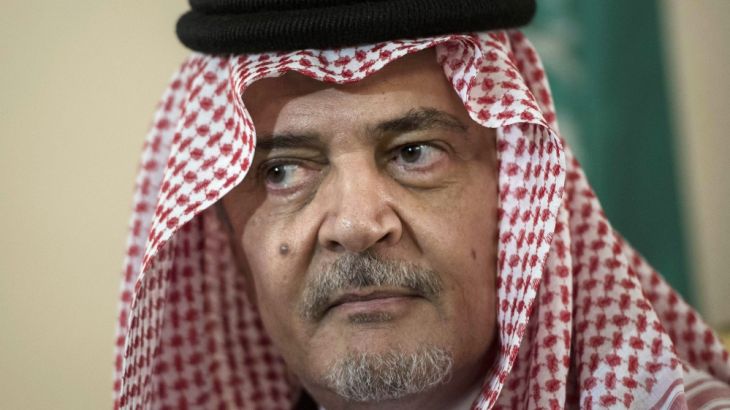Arab countries declare mourning after Saudi ex-FM dies
Flags flow on half-mast across the Arab world following death of Prince Saud, who served as minister for 40 years.

Days of mourning have been announced and flags flow on half-mast across the Arab world following the death of the former Saudi foreign minister, who oversaw four decades of diplomacy for the kingdom.
The Royal Court announced on Thursday the death of Prince Saud al-Faisal, one of the highest profile members of the country’s ruling elite and once the world’s longest serving foreign minister.
He was appointed in 1975, before being replaced in April this year as part of major government reshuffle. He suffered from several health problems, including chronic back pain.
Funeral prayers will be held on Saturday night in the Muslim holy city of Mecca.
Tributes poured in for the prince after news of his death was announced.
Both Egyptian President Abdel Fattah el-Sisi and Jordanian King Abdullah cut short their participation in a summit in Switzerland’s Davos to take part in the funeral ceremony, with Amman announcing 40 days of mourning and Cairo seven.
‘Historical leadership’
Bahraini King Hamad bin Essa al-Khalifa said in a statement that “the Arab and Islamic world lost a Arab and Islamic nations have lost a man of a great stature and a historical leadership who did not hesitate to serve the causes of his nation until the very last moment of his life”.
Bahrain also announced 40 days of mourning.
Qatar, the UAE, Oman, Algeria, Libya, Tunisia, Mauritania, Lebanon and the Palestinian Authority all declared three days of mourning.
Prince Saud served under four Saudi kings, advancing the kingdom’s foreign and playing an important role in shaping the country’s response to the many crises affecting the Middle East.
The former foreign minister’s tenure was marked by the Israeli invasions of Lebanon in 1978, 1982 and 2006, the Palestinian uprisings that erupted in 1987 and 2000, Iraq invading Iran in 1980 and Kuwait in 1990, and a US-led coalition’s occupation of Iraq in 2003.
He was also part of Saudi Arabia’s efforts to lessen Iran’s influence in the region, including the continuing conflict in Syria, where Saudi Arabia has been supporting several rebel groups. He strongly supported arming President bashar al-Assad’s opponents in 2012.
Following the announcement of his death, US President Barack Obama said that Prince Saud was a “committed and accomplished diplomat” whose “legacy will be remembered around the world”. Secretary of State John Kerry said he would miss his friendship and “wise counsel”.
French Foreign Minister Laurent Fabius said in a statement that the top diplomat had “worked tirelessly for peace and stability in the Middle East”.
Prince Saud was born in 1940 and was among Saudi Arabia’s first generation to receive a Western education. He received a degree in economics from Princeton University in the US.
He is the son of former King Faisal bin Abdulaziz al-Saud.
Prince Saud’s career as a diplomat began traumatically. He was named as foreign minister by the then newly appointed King Khaled bin Abdulaziz al-Saud following the assassination by a nephew of Prince Saud’s father Faisal, who had retained the foreign affairs portfolio after being made king in 1962.